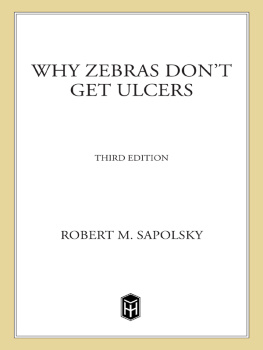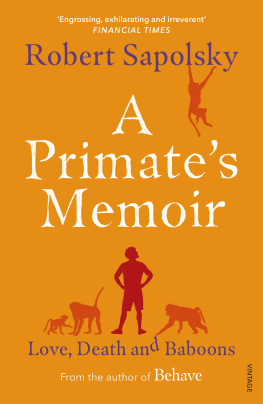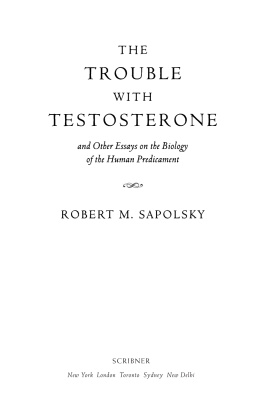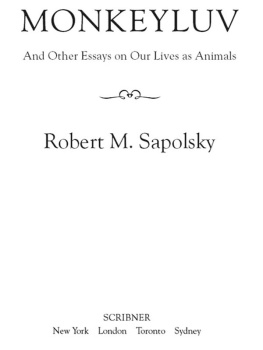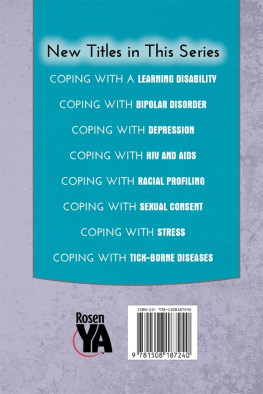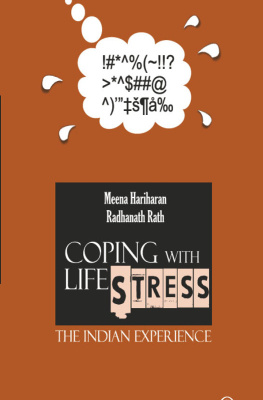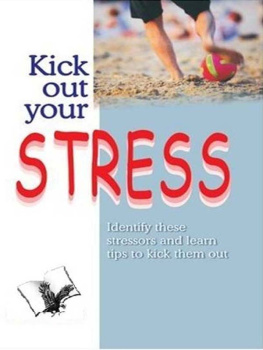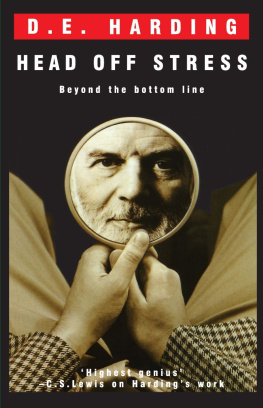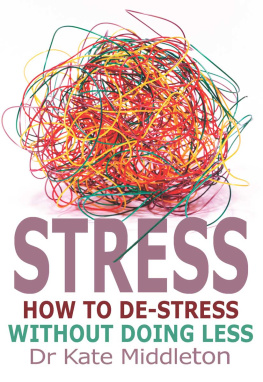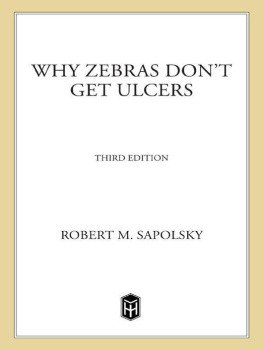Sapolsky - Why Zebras Dont Get Ulcers: The Acclaimed Guide to Stress, Stress-related Diseases, and Coping
Here you can read online Sapolsky - Why Zebras Dont Get Ulcers: The Acclaimed Guide to Stress, Stress-related Diseases, and Coping full text of the book (entire story) in english for free. Download pdf and epub, get meaning, cover and reviews about this ebook. year: 2004, publisher: Macmillan, genre: Romance novel. Description of the work, (preface) as well as reviews are available. Best literature library LitArk.com created for fans of good reading and offers a wide selection of genres:
Romance novel
Science fiction
Adventure
Detective
Science
History
Home and family
Prose
Art
Politics
Computer
Non-fiction
Religion
Business
Children
Humor
Choose a favorite category and find really read worthwhile books. Enjoy immersion in the world of imagination, feel the emotions of the characters or learn something new for yourself, make an fascinating discovery.
- Book:Why Zebras Dont Get Ulcers: The Acclaimed Guide to Stress, Stress-related Diseases, and Coping
- Author:
- Publisher:Macmillan
- Genre:
- Year:2004
- Rating:4 / 5
- Favourites:Add to favourites
- Your mark:
- 80
- 1
- 2
- 3
- 4
- 5
Why Zebras Dont Get Ulcers: The Acclaimed Guide to Stress, Stress-related Diseases, and Coping: summary, description and annotation
We offer to read an annotation, description, summary or preface (depends on what the author of the book "Why Zebras Dont Get Ulcers: The Acclaimed Guide to Stress, Stress-related Diseases, and Coping" wrote himself). If you haven't found the necessary information about the book — write in the comments, we will try to find it.
Sapolsky: author's other books
Who wrote Why Zebras Dont Get Ulcers: The Acclaimed Guide to Stress, Stress-related Diseases, and Coping? Find out the surname, the name of the author of the book and a list of all author's works by series.
Why Zebras Dont Get Ulcers: The Acclaimed Guide to Stress, Stress-related Diseases, and Coping — read online for free the complete book (whole text) full work
Below is the text of the book, divided by pages. System saving the place of the last page read, allows you to conveniently read the book "Why Zebras Dont Get Ulcers: The Acclaimed Guide to Stress, Stress-related Diseases, and Coping" online for free, without having to search again every time where you left off. Put a bookmark, and you can go to the page where you finished reading at any time.
Font size:
Interval:
Bookmark:


For Lisa, my best friend,
who has made my life complete
Perhaps youre reading this while browsing in a bookstore. If so, glance over at the guy down the aisle when hes not looking, the one pretending to be engrossed in the Stephen Hawking book. Take a good look at him. Hes probably not missing fingers from leprosy, or covered with smallpox scars, or shivering with malaria. Instead, he probably appears perfectly healthy, which is to say he has the same diseases that most of us havecholesterol levels that are high for an ape, hearing that has become far less acute than in a hunter-gatherer of his age, a tendency to dampen his tension with Valium. We in our Western society now tend to get different diseases than we used to. But whats more important, we tend to get different kinds of diseases now, with very different causes and consequences. A millennium ago, a young hunter-gatherer inadvertently would eat a reedbuck riddled with anthrax and the consequences are clearshes dead a few days later. Now, a young lawyer unthinkingly decides that red meat, fried foods, and a couple of beers per dinner constitute a desirable diet, and the consequences are anything but cleara half-century later, maybe hes crippled with cardiovascular disease, or maybe hes taking bike trips with his grandkids. Which outcome occurs depends on some obvious nuts-and-bolts factors, like what his liver does with cholesterol, what levels of certain enzymes are in his fat cells, whether he has any congenital weaknesses in the walls of his blood vessels. But the outcome will also depend heavily on such surprising factors as his personality, the amount of emotional stress he experiences over the years, whether he has someones shoulder to cry on when those stressors occur.
There has been a revolution in medicine concerning how we think about the diseases that now afflict us. It involves recognizing the interactions between the body and the mind, the ways in which emotions and personality can have a tremendous impact on the functioning and health of virtually every cell in the body. It is about the role of stress in making some of us more vulnerable to disease, the ways in which some of us cope with stressors, and the critical notion that you cannot really understand a disease in vacuo, but rather only in the context of the person suffering from that disease.
This is the subject of my book. I begin by trying to clarify the meaning of the nebulous concept of stress and to teach, with a minimum of pain, how various hormones and parts of the brain are mobilized in response to stress. I then focus on the links between stress and increased risk for certain types of disease, going, chapter by chapter, through the effects of stress on the circulatory system, on energy storage, on growth, reproduction, the immune system, and so on. Next I describe how the aging process may be influenced by the amount of stress experienced over a lifetime. I then examine the link between stress and the most common and arguably most crippling of psychiatric disorders, major depression. As part of updating the material for this third edition, I have added two new chapters: one on the interactions between stress and sleep, and one on what stress has to do with addiction. In addition, of the chapters that appeared in the previous edition, I rewrote about a third to half of the material.
Some of the news in this book is grimsustained or repeated stress can disrupt our bodies in seemingly endless ways. Yet most of us are not incapacitated by stress-related disease. Instead, we cope, both physiologically and psychologically, and some of us are spectacularly successful at it. For the reader who has held on until the end, the final chapter reviews what is known about stress management and how some of its principles can be applied to our everyday lives. There is much to be optimistic about.
I believe that everyone can benefit from some of these ideas and can be excited by the science on which they are based. Science provides us with some of the most elegant, stimulating puzzles that life has to offer. It throws some of the most provocative ideas into our arenas of moral debate. Occasionally, it improves our lives. I love science, and it pains me to think that so many are terrified of the subject or feel that choosing science means that you cannot also choose compassion, or the arts, or be awed by nature. Science is not meant to cure us of mystery, but to reinvent and reinvigorate it.
Thus I think that any science book for nonscientists should attempt to convey that excitement, to make the subject interesting and accessible even to those who would normally not be caught dead near the subject. That has been a particular goal of mine in this book. Often, it has meant simplifying complex ideas, and as a counterbalance to this, I include copious references at the end of the book, often with annotations concerning controversies and subtleties about material presented in the main text. These references are an excellent entre for those readers who want something more detailed on the subject.
Many sections of this book contain material about which I am far from expert, and over the course of the writing, a large number of savants have been called for advice, clarification, and verification of facts. I thank them all for their generosity with their time and expertise: Nancy Adler, John Angier, Robert Axelrod, Alan Baldrich, Marcia Barinaga, Alan Basbaum, Andrew Baum, Justo Bautisto, Tom Belva, Anat Biegon, Vic Boff (whose brand of vitamins graces the cupboards of my parents home), Carlos Camargo, Matt Cartmill, M. Linette Casey, Richard Chapman, Cynthia Clinkingbeard, Felix Conte, George Daniels, Regio DeSilva, Irven DeVore, Klaus Dinkel, James Doherty, John Dolph, Leroi DuBeck, Richard Estes, Michael Fanselow, David Feldman, Caleb Tuck Finch, Paul Fitzgerald, Gerry Friedland, Meyer Friedman, Rose Frisch, Roger Gosden, Bob Grossfield, Kenneth Hawley, Ray Hintz, Allan Hobson, Robert Kessler, Bruce Knauft, Mary Jeanne Kreek, Stephen Laberge, Emmit Lam, Jim Latcher, Richard Lazarus, Helen Leroy, Jon Levine, Seymour Levine, John Liebeskind, Ted Macolvena, Jodi Maxmin, Michael Miller, Peter Milner, Gary Moberg, Anne Moyer, Terry Muilenburg, Ronald Myers, Carol Otis, Daniel Pearl, Ciran Phibbs, Jenny Pierce, Ted Pincus, Virginia Price, Gerald Reaven, Sam Ridgeway, Carolyn Ristau, Jeffrey Ritterman, Paul Rosch, Ron Rosenfeld, Aryeh Routtenberg, Paul Saenger, Saul Schanburg, Kurt Schmidt-Nielson, Carol Shively, J. David Singer, Bart Sparagon, David Speigel, Ed Spielman, Dennis Styne, Steve Suomi, Jerry Tally, Carl Thoresen, Peter Tyak, David Wake, Michelle Warren, Jay Weiss, Owen Wolkowitz, Carol Worthman, and Richard Wurtman.
I am particularly grateful to the handful of peoplefriends, collaborators, colleagues, and ex-teacherswho took time out of their immensely busy schedules to read chapters. I shudder to think of the errors and distortions that would have remained had they not tactfully told me I didnt know what I was writing about. I thank them all sincerely: Robert Ader of the University of Rochester; Stephen Bezruchka of the University of Washington; Marvin Brown of the University of California, San Diego; Laurence Frank at the University of California, Berkeley; Craig Heller of Stanford University; Jay Kaplan of Bowman Gray Medical School; Ichiro Kawachi of Harvard University; George Koob of the Scripps Clinic; Charles Nemeroff of Emory University; Seymour Reichlin of Tufts/New England Medical Center; Robert Rose of the MacArthur Foundation; Tim Meier of Stanford University; Wylie Vale of the Salk Institute; Jay Weiss of Emory University; and Redford Williams of Duke University.
Font size:
Interval:
Bookmark:
Similar books «Why Zebras Dont Get Ulcers: The Acclaimed Guide to Stress, Stress-related Diseases, and Coping»
Look at similar books to Why Zebras Dont Get Ulcers: The Acclaimed Guide to Stress, Stress-related Diseases, and Coping. We have selected literature similar in name and meaning in the hope of providing readers with more options to find new, interesting, not yet read works.
Discussion, reviews of the book Why Zebras Dont Get Ulcers: The Acclaimed Guide to Stress, Stress-related Diseases, and Coping and just readers' own opinions. Leave your comments, write what you think about the work, its meaning or the main characters. Specify what exactly you liked and what you didn't like, and why you think so.

